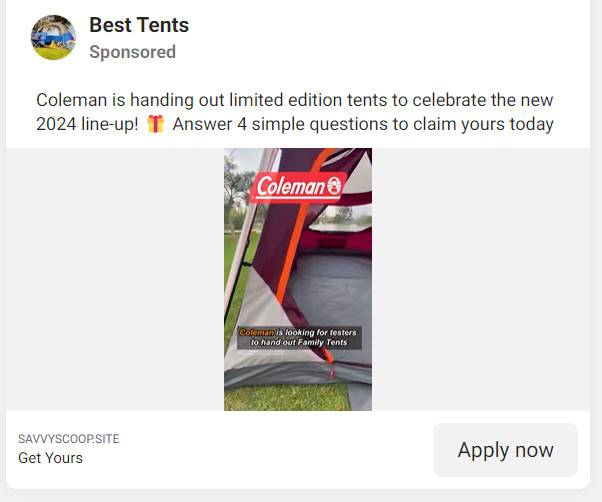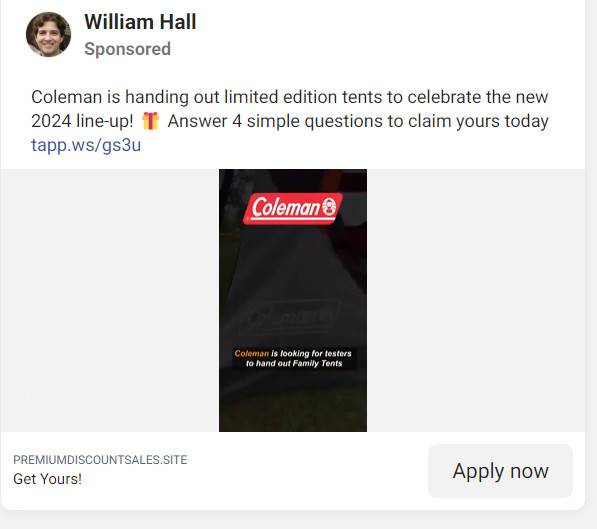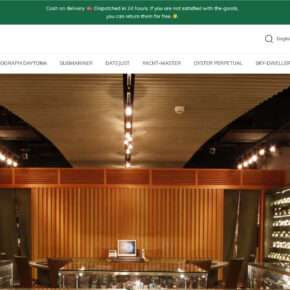Score a free Coleman tent just for entering an online giveaway? This tantalizing offer popping up on Facebook seems like an amazing deal for outdoor enthusiasts. But before you hurriedly click that ad link or provide any personal details, know that this is just the latest viral scam exploiting brand familiarity and product demand to steal from consumers.
In this eye-opening exposé, we uncover the truth behind the Coleman tent giveaway fraud circulating widely on social platforms. You’ll learn how these increasingly common social media cons work, where they ultimately lead, and most crucially, how to protect your information and avoid getting duped.
Let your dreams of camping under the stars for free motivate you to arm yourself with knowledge. Join us in exploring the tactics used in this scam so you can recognize false promotions and help shut fraudsters down. Time to go behind the seams and expose this deception once and for all.


Anatomy of the Elaborate Coleman Tents Giveaway Fraud
A tempting new scam promotion promising free Coleman tents has exploded across social media lately. The ads claim Coleman is giving away free tents and urge users to click through to claim one before the limited-time offer ends. But prudent internet users will want to scrutinize this viral giveaway more closely before providing any personal information or credit card details.
Let’s dive deep into how this increasingly common scam works and why so many consumers have fallen victim already. By understanding the strategic deception tactics used at each stage of the fraud funnel, we can avoid getting caught in this trap.
The scam starts with sponsored posts on Facebook and Instagram using Coleman branding and tent imagery. The ads tell users to click through quickly to enter and win one of the in-demand Coleman tents before the exclusive giveaway ends. Urgency and scarcity cues give the false impression of a limited-time opportunity.

Clicking the link in the sponsored posts brings users to elaborate fake websites pretending to be official Coleman tent registration portals. The sites use convincing Coleman logos, graphics, and tent photos to maintain the illusion of legitimacy. Some even have videos and testimonials further reinforcing that users are in the right place to score their free tent.
On the fraudulent portal sites, users are prompted to complete registration forms providing personal details like their full name, home address, email address, phone number and more. This is all under the guise that it’s required information in order to ship out the prize tent they won. In reality, it is just an information harvesting operation.
As a final step, users are instructed to enter their full credit card details. This is often disguised as a small $7.95 shipping and handling or processing fee that needs to be paid for the company to send out the free tent. Users believe they are just covering a nominal shipping cost.
However, victims soon notice mysterious monthly fees around $150 charged by vague third parties showing up on their credit card statements. This is when it becomes clear the initial $7.95 charge has actually enabled the scammers to establish recurring billing access to their credit card, rather than being a one-time shipping cost.
By revealing the strategic process used in the fraud funnel, we can recognize these viral Coleman tent giveaways for what they really are – an elaborate ruse simply to harvest user information and enable recurring credit card charges through deception. Prudent internet users will always verify promotions directly through official company channels before providing any personal data or payment information.
This scam has been also investigated by Jordan Liles on his YouTube channel, where he offers a detailed video on the subject. We recommend watching his content for a comprehensive understanding of the scam.
Next, let’s break down exactly how scammers carry out this scam from start to finish.
How the Coleman Tents Scam Funnel Works
The Coleman tent giveaway scam is executed through a strategic step-by-step playbook designed to gradually gain the trust of users and extract their personal data and payment information. Let’s walk through what happens at each stage of the fraud funnel:
Step 1: Creating the Enticing Social Media Posts
The scammers create Facebook and Instagram ads with Coleman branding and tent imagery. The copy talks about a special giveaway promotion to create buzz and lure people in. Phrases like “We’re looking for product testers!” or “Claim your free tent for our anniversary!” give the impression of an exclusive opportunity.
Step 2: Driving Traffic to the Fake Portal Website
The post copy urges users to click now before the limited-time offer ends. The “Click Here” button goes to an elaborate scam portal made to look like the official Coleman website. Logos, graphics, tent photos, and Coleman videos immerse visitors in the brand world.
Step 3: Collecting User Information for “Registration”
On the portal, users are prompted to complete a registration form asking for details like name, home address, email, phone number, etc. Supposedly this is to register for the giveaway but it’s really just harvesting data.
Step 4: Obtaining Credit Card Information
Next visitors are asked for credit card information, often disguised as a small $7.95 “shipping and handling fee” to receive the free tent. Users believe this is just covering shipping costs.
Step 5: Charging Monthly Recurring Fees
With credit card data obtained, scammers begin charging recurring monthly subscription fees around $150 under vague descriptions from foreign third parties.
Step 6: No Tent Ships Out
It soon becomes clear as unexpected fees accrue but no tent arrives that the giveaway was fake. The credit card info enables endless unauthorized billing.
Understanding each step of the process makes it clear this is not a real Coleman promotion. Always go to Coleman.com directly to verify special offers rather than trusting third-party social media posts and links. Don’t provide information to any site you did not navigate to yourself from the official branded webpage or app.
What To Do If You Were Scammed
If you already provided your personal or financial information through one of these fraudulent Coleman tent giveaway promotions, don’t panic – but do act swiftly to limit the potential damages. Here are some important steps to take if you fell victim to this scam:
- Contact your credit card provider immediately to report unauthorized charges. Request that they block any future recurring subscription fees connected to the scam merchants. Have your card cancelled and reissued so the scammers can no longer charge it.
- Closely monitor your credit card statements moving forward and dispute any strange charges. Keep an eye out for small monthly fees that may not stick out. Don’t pay for anything you did not expressly agree to.
- Consider freezing your credit if you believe your identity may have been compromised. This prevents scammers from opening any new credit cards or loans in your name.
- Reset passwords on any online accounts you may have accessed through links in the scam ads. Change passwords and security questions to protect your other accounts in case of a breach. Enable two-factor authentication wherever possible.
- Contact the major credit bureaus – Experian, Equifax and TransUnion – to place fraud alerts on your account if identity theft is suspected. This makes it harder for scammers to open new credit.
- Document details about the scam promotion including dates, accounts, pages or groups promoting it. Report it to the FTC, IC3, social networks, Coleman and your local authorities.
- Educate yourself on common online promotion red flags like unreasonable free gifts, urgent limited-time claims, or requests for personal data and credit card info. Learn to scrutinize all special offers before participating.
- Warn others in your social network about current scam promotions to prevent more innocent victims. Share articles exposing the fraud to make more people aware. Report fake accounts to get them taken down.
Stay proactive even if you got duped on this one – falling for clever scams can happen to anyone. But by taking swift action, monitoring your accounts diligently, and learning to spot shady promotions, you can limit the fallout and avoid being targeted again. Don’t let scammers take advantage of your excitement for an amazing deal on a Coleman tent.
Frequently Asked Questions About the Viral Coleman Tent Giveaway Scam
1. What is the Coleman tent giveaway scam?
This is a fraudulent promotion using fake Facebook and Instagram ads claiming Coleman is giving away free tents. It aims to trick users into providing personal and payment information.
2. How are they advertising the fake giveaway?
Scammers create social media posts with Coleman logos saying they are looking for “product testers” or celebrating an “anniversary”. The posts urge users to click suspicious links to register.
3. What happens when you click the link in the ads?
The links redirect users to elaborate fake websites pretending to be an official Coleman promotion portal to claim your “free” tent.
4. What information do the fake websites ask for?
The scam sites have registration forms asking for your full name, address, email, phone number, and crucially – credit card information.
5. Why do they want your credit card info?
This allows scammers to start making unauthorized recurring monthly charges to your card, often for expensive subscription fees users didn’t agree to.
6. Do you actually get a free Coleman tent?
No. The entire giveaway is fabricated. No tents are ever shipped out, as it’s solely a ploy to harvest user data.
7. What should you do if you shared information?
Contact your credit card company immediately to report fraud, block charges and cancel your card. Monitor statements closely for strange charges.
8. How can you spot these fake giveaways?
Be skeptical of limited-time offers, typos, unofficial domains, urgency cues, free gifts requiring your data, and requests for credit card info.
9. How can you protect yourself from these scams?
Never provide information without verifying directly with Coleman. Report suspicious ads or accounts. Enable enhanced security on your accounts.
10. How can you report the scam ads or sites?
Collect details on the posts, accounts and domains scamming people. Report them to Facebook, Coleman, FTC, credit card companies, IC3.
Bottom Line: Verify All Online Giveaways Before Participating
The promise of scoring a free Coleman tent may be exciting, but prudent internet users will recognize these viral promotions as just another scam. Always verify directly with Coleman first and exercise extreme caution when asked for any personal or financial information through social media ads and third-party links. Through education and awareness, we can shut these fraudsters down.



